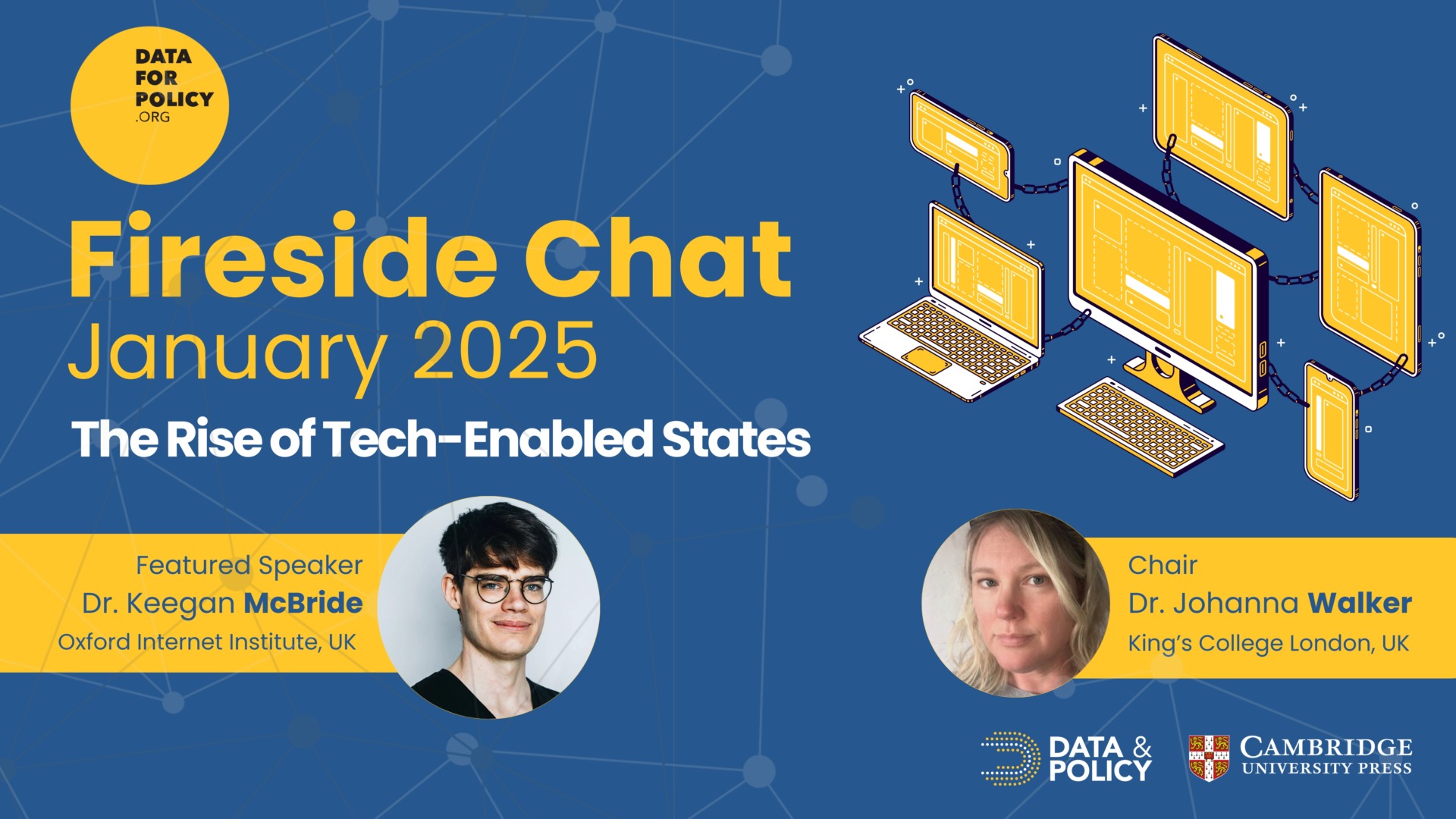On 29 January, 2025, we hosted the third session of our Fireside Chat series, featuring Dr. Keegan McBride from the Oxford Internet Institute. Chaired by Dr. Johanna Walker from King’s College London, the session delved into Dr. McBride’s research on “The Rise of Tech-Enabled States.” The discussion explored how governments are using digital infrastructure to enhance resilience, focusing on the geopolitical, sustainability, and environmental challenges tied to digital governance.
The session was enriched by interactive contributions from Data for Policy CIC Directors Prof. Jon Crowcroft and Prof. Stefaan Verhulst, along with editorial committee members Dr. Maria Lorena Flórez Rojas, Prof. Igor Calzada, and Nai Lee Kalema from the Data for Policy community.
Key points of discussion included:
-
Digital Transformation as a Necessity: Dr. McBride emphasized that adopting digital technologies like AI, blockchain, and IoT has become essential for governments to remain effective. The COVID-19 pandemic underscored the importance of digital readiness, with countries like Estonia able to maintain operations seamlessly during lockdowns, while others struggled.
-
Geopolitical Implications of Digitalisation: Digital tools have evolved from being seen as democratizing forces to becoming instruments of control in the hands of authoritarian regimes, like China. At the same time, countries like Estonia, which have pioneered digital governance, have gained significant soft power. The competition between the U.S. and China for digital dominance was also discussed, with both nations striving to export their respective models globally.
-
Resilience and Vulnerabilities: While digital infrastructure strengthens resilience, it also exposes governments to new vulnerabilities. During the Ukraine conflict, Russian forces targeted Ukrainian data centers to disrupt governance. The potential of cloud-based governance was highlighted, enabling governments to operate even if physical territory is lost, such as in the case of island nations affected by rising sea levels.
-
Public-Private Dynamics: The session explored the role of tech giants like Amazon, Google, and Microsoft, which provide critical digital infrastructure to governments. While these companies offer innovation, their dominance raises concerns about dependency, especially for smaller nations without domestic alternatives. It was noted that governments must find a balance between leveraging private sector expertise and maintaining control over crucial infrastructure.
-
AI and Compute Power: The U.S.’s dominance in AI, driven by its control over key technologies like NVIDIA GPUs, was examined. However, emerging alternatives like DeepSeek, which optimises AI for devices with limited memory, challenge the conventional view that massive computing power is required for AI innovation. This raises important questions for regions such as Europe and the Global South, which rely on U.S.-based tech.
-
Sustainability and Environmental Costs: The environmental costs of digitalisation were also addressed. Data centers, which consume significant energy and water, are under scrutiny, particularly in regions like Chile and Uruguay where protests have arisen over their environmental impact. More sustainable alternatives, such as federated learning, which decentralises computing tasks, were discussed as a way to reduce the environmental footprint.
-
Digital Sovereignty in the Global South: The session concluded with a discussion on the importance of digital sovereignty for nations in the Global South. Dr. McBride emphasized that developing domestic tech capabilities is crucial to reduce reliance on foreign companies. Regional alliances, like the collaboration between Singapore and Rwanda on AI governance, offer pathways for smaller nations to assert their digital sovereignty while balancing development and sustainability concerns.
The session highlighted the need for careful balancing between technological advancement, geopolitical influence, and sustainability. We look forward to continuing these important conversations in future Fireside Chat sessions.
To learn more about this session and watch the full conversation, visit this page.

